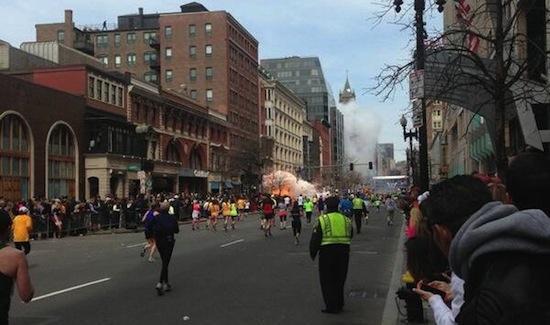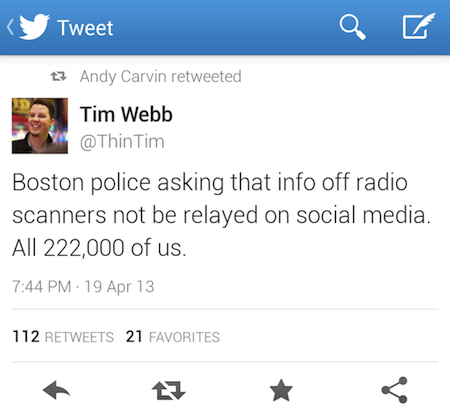
Running, analyzing, and cornering the Boston Marathon Bombing into a stream of comprehensible data has proven difficult over the past week. There is just so much information to comprehend and every bit of it has proven useful in one way or another. The vast amount of mobile devices and closed circuit cameras with an eye on the bombing have led to this abundance of digital content. Legacy news outlets like CNN and NBC have had their hands full against the Internet.
But in the end, this pile of data has led us right into the mirth of the civilian's role in a time of disaster. There is no point in ignoring the facts; we would not have gotten this far without social media and the Internet's voice as a complimentary news outlet to the big time news agencies.
The smartphone as the multifaceted interface of texts, calls, and Internet capabilities has once again proven that the civilian's role in a time of disaster is edging closer to journalism. But this isn't news, it's just more obvious now.
The sheer mass of connected devices in the area surrounding the explosion has led us straight into the heart of the ruthlessness that is the Tsarnaev brothers, the alleged conspirators who devised the explosion. Yet in the moments following the bombing, society found a truth in mobile technology by trending #OneBoston. And without mobile tech, it would not have gone down like this. There wouldn't have been a voice without the apps on our smartphones providing us a platform to speak upon.
I don't think I'm alone in thinking social media has become my number one source for news. The platform Twitter was built upon has largely made it a surreal way to engage in events as they're happening. Look to CNN's false reporting debacle and you'll find that anyone on the ground in Boston was a source thanks to the smartphone.
You'll find even more ways to engage in breaking news if you search hard enough. There are Police Scanners broadcasting information in real-time. There are closed circuit cameras providing a bird's-eye view of Boston. All you need is a smartphone, or computer to partake in the action.

But at the end of the day, it has been social media sources like Twitter and Vine that have sold the smartphone's capabilities in journalism, and I am happy I follow this industry as closely as I do.
It's easy to get caught up in megapixel count and processor cores of each new device and forget that each smartphone has the same subset of functions. I am in no way, shape or form saying the mobile industry shouldn't be as competitive an industry as it is. Without the technological prowess and research put into each and every new device, we might not be salivating over 468ppi displays, or 8-Core mobile phone CPU's. I'm just here to point out the fact that while we remain connected to blazing fast 4G LTE download speeds and gawk at 5.5-inch displays, at the end of the day, the smartphone has harbored "citizen journalism" to the point of no return.
Thanks, phone.
The issue surely to be discussed once the Boston Marathon Bombing has left the prime time spotlight will not be the "bad reporting" from Reddit, 4Chan, and Twitter over the past 48 hours, but rather the point at which legacy media reporting has confronted the Internet's key advantages in breaking news. Often times, citizen reporting even portrays information more accurately, but only if the facts trend.
And it didn't take long before I noticed facts quickly become a by-product by nature of breaking news. Both sides of reporting have faulted along the way, with the NY Post posting the wrong images of suspects and claiming arrests, to Twitter trending #ManOnRoof for no apparent reason.
At the end of the day, this abundance of reporting has once again put social media and the smartphone on a pedestal. There will be arguments about social media diverging attention from verified information to the disadvantage of immediacy. And there is clearly going to be a confrontation between legacy media and "citizen reporting" after we can sit down and marinate in the facts.
But when it's all said and done, the smartphone was the facilitator of connectivity and provided information at a rate I never thought possible. This manhunt lasted four days. The smartphone may have condemned credibility for the sake of immediacy and allowed anyone to weigh-in on the action, but our voices were escalated through the reigns of the Internet without pause, and I'm thankful for the role society played. The smartphone is the real winner here. #HealingIsNext.
Image via FitsNews.